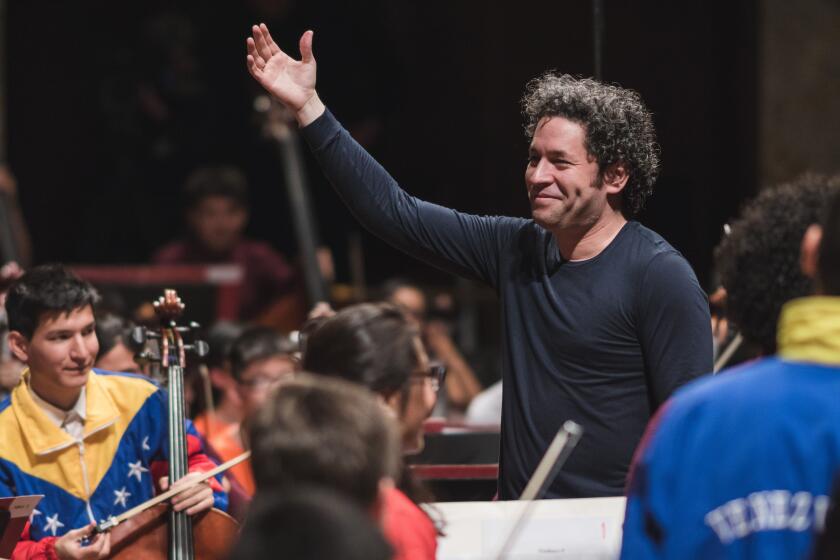VOCAL STARS WITH THEIR OWN AGENDAS : Soprano Benita Valente Chooses Her Own Music--and Her Destiny
- Share via
“At one of the turning points in my life--and there have been several,” Benita Valente remembers, “I was supposed to sing Sophie in a production of ‘Rosenkavalier’ at the Music Academy of the West (in Santa Barbara),” as well as participate in other summer activities there.
“When I found out they had given the part to someone else, I was so angry I didn’t go at all, but accepted an invitation to spend the summer at the Marlboro Festival in Vermont.”
Valente succeeded at Marlboro with a vengeance, returning there for many summers afterward, becoming linked professionally with other Marlboro musicians, even recording with them.
So linked has Valente become with what some West Coasters consider an East Coast musical establishment, the impression has been that she has sung here very little.
Backstage at the Pavilion Monday--Valente had arrived a day early for her appearances this week with the Los Angeles Philharmonic--the black-haired soprano gently dispelled that impression.
A native Californian who went to study at the Curtis Institute in Philadelphia in the mid-1950s, joined the roster of the Metropolitan Opera in 1973 and has accomplished the substance of her career on the East Coast, Valente actually made her operatic debut right here in Los Angeles in 1955.
It was shortly before she went to Curtis, and it was as Barbarina in a workshop production of “The Marriage of Figaro.”
“That was a long time ago,” Valente, who sings New Year’s concerts with the Los Angeles Philharmonic and conductor John Williams tonight and Friday in the Pavilion of the Music Center, acknowledges.
At a mellow 52, the soprano, who was a student of Lotte Lehmann at the Music Academy of the West in Santa Barbara before she went East under the tutelage of Martial Singher, serves as a role model to younger colleagues as well as a permanent musical fixture on the East Coast.
“But I haven’t stayed away from my home state,” she is quick to point out.
She lists recent California visits she has made with both the La Salle and Guarneri quartets. She appeared as Nannetta in “Falstaff” with Sarah Caldwell’s American National Opera at the Pavilion in 1968.
Eleven years later, she was Violetta in the “Traviata” production that launched Long Beach Opera. Two years ago, she made her Philharmonic debut in the “Olympic Prelude” concert at Hollywood Bowl. And, just three months ago, she was a principal participant in the opening-night festivities at the Orange County Performing Arts Center in Costa Mesa.
In a career now going back 26 years--to 1960, the year she won the Metropolitan Opera national auditions--Valente says she has been “usually lucky enough to be able to choose my own options.”
For instance: “I never wanted to do much touring--and so I didn’t.” Once she traveled with conductor Robert Shaw and his chorale, “on a national tour with the St. John Passion. We got as far west as Texas.” Later, as a member of the Bach Aria Group, Valente traveled briefly for a couple of seasons.
“But those long tours, with three concerts a week for endless weeks--I’ve never had to do that.”
Valente has also, she remembers with some pride, “never had to sing music I don’t care a lot about. That’s lucky too.” Where repertory is concerned, Valente--who has specialized at various times in her career in Mozart, Handel, lieder and contemporary music--has made her own choices.
The musical items she sings this week with the Philharmonic, for example.
“I’ve sung ‘Vilia’ countless times, but never was interested in ‘Wien, Wien, nur du allein.’ So, Mr. (Ernest) Fleischmann (executive director of the Philharmonic) and I talked back and forth several times, and we finally came up with a program.”
In addition to “Vilia,” Valente will sing “Im chambre separee” from Heuberger’s “Der Opernball,” Marietta’s Lied from “Die tote Stadt” and Norina’s Cavatina from “Don Pasquale.”
During the season in which she sang at the recent reopening of Carnegie Hall in New York City, Valente will return there April 1 for her first solo vocal recital in the hall.
She says she likes “to lump all my recitals together in one time period,” because of the concentration the form requires. To that end, she begins her winter recital season at the end of February in Binghamton, N.Y., and closes it in Carnegie Hall, five weeks later.
Asked if she believes, as many do, that the solo vocal recital is dead, the soprano responds, with some heat, “I don’t think it’s true. The audiences are still out there. Look at all those people who used to come out for (Dietrich) Fischer-Dieskau. They’re still there. But you can’t offer them a lieder recital mixed up with a lot of arias. They won’t come to that.”
More to Read
The biggest entertainment stories
Get our big stories about Hollywood, film, television, music, arts, culture and more right in your inbox as soon as they publish.
You may occasionally receive promotional content from the Los Angeles Times.










